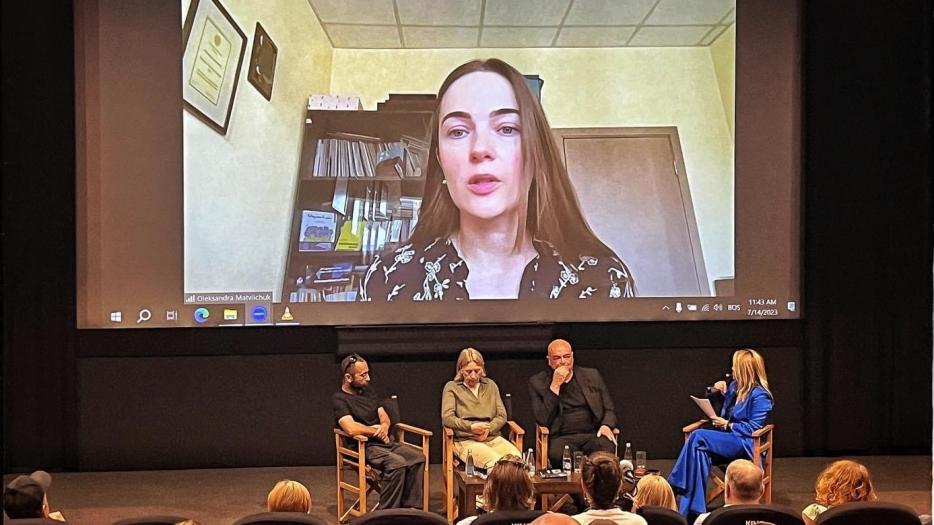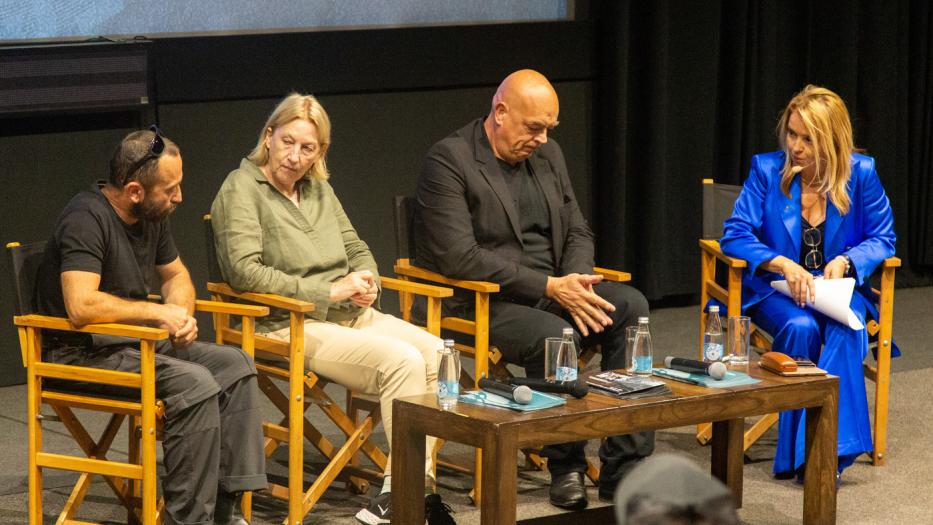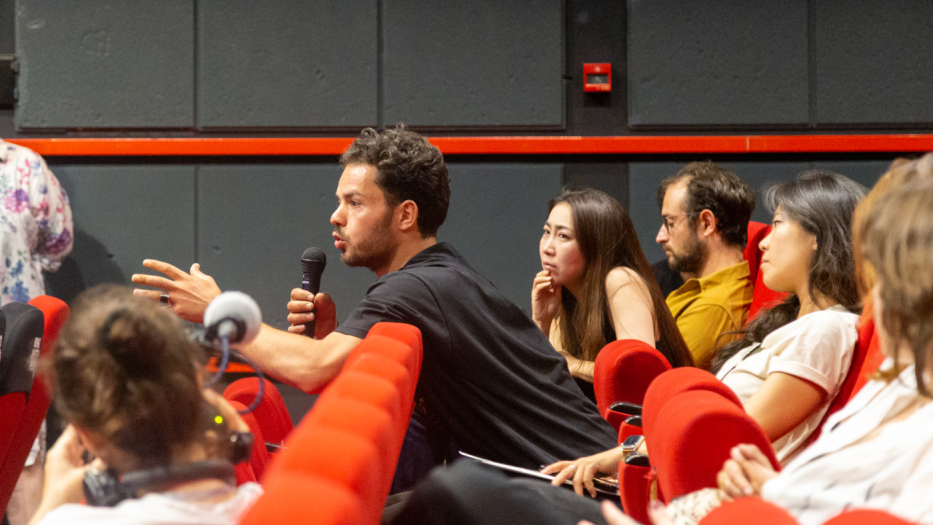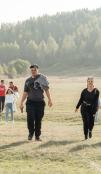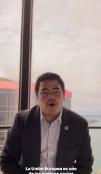Reporting from Ukraine – a discussion with world’s top war correspondents
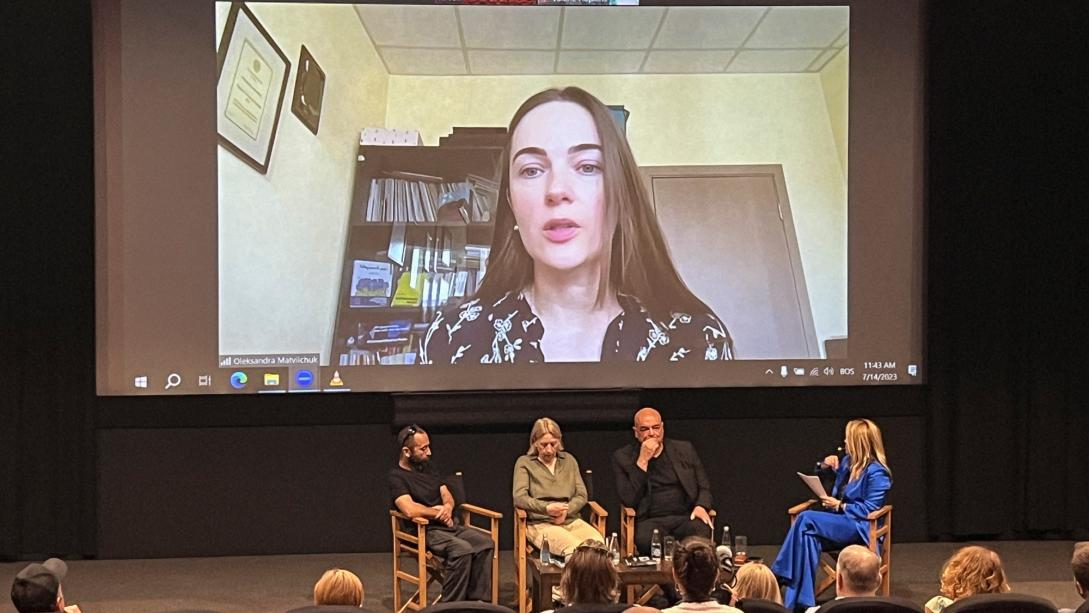
Pictured: Oleksandra MatviichukI addresses the Reporting from Ukraine conference in Sarajevo.
The view emerged at a gathering in Sarajevo on 14 July 2023 of some of the world’s most reputable war-correspondents, civic activists and photographers. The event was organised by the EEAS Stratcom Western Balkans Task Force, in collaboration with the EU Delegation to Bosnia and Herzegovina, and in partnership with the international WARM Foundation --dedicated to war reporting, war art and war memory.
The panel discussed different angles of the aggression on Ukraine. The guests included Oleksandra Matviichuk, head of the Kyiv-based non-profit organization Centre for Civil Liberties, awarded the Nobel Peace Prize in 2022, Rémy Ourdan, war correspondent for French publication Le Monde, senior correspondent for The New York Times, Carlotta Gall. Also included was Soviet Union-born Israeli freelance photographer Edward Kaprov, who publishes in leading international magazines all of whom have reported from Ukraine, and Valerie Hopkins, Moscow correspondent for The New York Times, who reported from Ukraine prior to her assignment in Moscow.
Tributes to young French-Bosnian journalist
Reporting from the frontlines, journalists make huge sacrifices and some of them pay the ultimate price. At least 17 journalists and media workers have been killed in Ukraine since Russia’s full-scale invasion began.
One of them was French journalist Arman Soldin. Doing his job, reporting from Donbas, Arman paid that ultimate price. A Russian missile took his life on the 9th of May 2023 while he was reporting from the front lines.
Arman was born in Sarajevo in 1991. As a 12-month old baby, he was evacuated to France when the war in Bosnia and Herzegovina broke out. A tribute in his honour took place on the same morning that the news became public that French President Macron posthumously awarded Soldin with France’s highest order of merit, the Legion d’Honneur (Legion of Honour) in his native city.
A short documentary by AFP featuring Soldin’s footage was shown during the tribute.
Arman Soldin embodied a passion to convey the truth, tell stories and gather testimonies, with a sense of duty to inform.
Duty to inform
In a letter to Agence France Presse, President Emmanuel Macron praised Soldin, saying that ‘Arman Soldin embodied a passion to convey the truth, tell stories and gather testimonies, with a sense of duty to inform.’
The panellists echoed this sentiment. Rémy Ourdan, a war correspondent for Le Monde, met Arman as a young man, first in Paris and Sarajevo, later in Kyiv. He was already a superb reporter.
‘He was an exceptional reporter,’ Ourdan said. ‘More experienced war correspondents meet hundreds of new ones when they arrive. One would notice someone like Arman immediately. He was extraordinarily good.’
Ourdan’s remarks were spoken in front of an audience at the Kino Meeting Point in Sarajevo which included Arman Soldin’s father and two sisters.
The event also focused on the different forms of pressure and intimidation journalists face daily. One of the most recent cases is that of TheWall Street journalist Evan Gershkovich, incarcerated in a Russian prison since his arrest in Yekaterinburg on bogus espionage charges. Such oppressive practices have not been seen since the end of the Soviet era in the 1990s.
Valerie Hopkins, The New York Times Moscow correspondent, urged everybody watching the event via EU social media channels or watching live on Sarajevo TV’s broadcast channel to read Evan’s texts, follow his work and write to him in prison, where he has been confined for more than 100 days.
The disinformation blur
The panellists also discussed the ways in which disinformation aims to blur the view of the Russian aggression on Ukraine. It manages to confuse audiences across the world about what the war is about and what is actually happening.
A feature of every war, disinformation has been weaponized throughout history, panellists said, but thanks to new technologies, the scale of Russian disinformation today is overwhelming.
While reflecting on many conflicts he has covered over the last 30 years, Ourdan has noticed a clear change, especially in his readership.
‘Before, we would get both a praise and criticism for our reporting. But the latter would be based on either ideology or facts,’ he said.
‘Today, some readers simply write, “I do not believe a word of what you say,”’ said Ourdan, wondering what to can be done about this phenomenon, and where the lack of trust in professional journalists comes from.
Carlotta Gall, The New York Times senior correspondent, had a clear idea.
‘The troll farms that Russia is known for, not only cause distrust in the media, but also put journalists in unprecedented danger,’ said Gall. She added that journalists today face completely new challenges while reporting on war.
Mistrust in the media is a bigger problem for professional journalists now
‘Mistrust in the media is a bigger problem for professional journalists now,’ she said, ‘And that is often caused by the authorities themselves.’
Evidence of atrocities
Oleksandra Matviichuk, the Head of the Kyiv-based non-profit organization Centre for Civil Liberties, which was awarded the Nobel Peace Prize in 2022, spoke about the importance of tirelessly gathering evidence of atrocities across Ukraine.
‘As a human rights lawyer who has been documenting war crimes for nine years, I spoke with hundreds of victims,’ Matviichuk said, ‘And I know that these people need to restore not only their broken lives and broken families, broken visions of the future, but also their broken belief that justice is possible, even though delayed in time.’
She presented her organization’s ambitious goal to document each criminal act which has been committed by the invading Russian troops, arguing that findings of this laborious work should be used in a new court where Vladimir Putin himself can be tried.
‘Today, there is no such court,’ Matviichuk said.
Ourdan covered the war in Bosnia and Herzegovina from its beginning to its end. He remembered how war correspondents in besieged Sarajevo reacted to the news that a Tribunal for the former Yugoslavia was to be established.
‘The lack of justice was so total and prolonged that all hope seemed lost at that time,’ he said, ‘But, things change.’
Justice does exist
Years later, both internationally acclaimed correspondents participating in the panel, Ourdan and Hopkins, covered the war crime trials of the main culprits who were convicted, restoring the hope that international criminal justice does exist.
Edward Kaprov, the Soviet-born documentary photographer from Israel said he could not avoid going to Ukraine after the invasion started.
'Ukraine was a part of my motherland that no longer exists,' said Kaprov. 'My ancestors are from Ukraine, and lots of my close friends are now living in Ukraine. I could not stay aside when egregious injustice started to occur there.'
At a time when everybody is speeding up with digital photos saturating audiences, he decided to slow down by taking pictures using a wet collodion technique with a five-second exposure. The technique was originally used to image the Crimean War (1854-56) which was the first conflict ever to be covered by a war correspondent.
In order to document the frontlines of Ukraine, he has adopted this old-style technique to cover ‘an old style war’ as experienced war correspondents call the current one in Ukraine. This approach has grabbed the attention of audiences across the world.
Documenting war crimes
Also in the audience in Sarajevo was Mykhailyna Skoryk-Shkarivska, Deputy Mayor of Bucha. She praised the work of journalists in documenting the Russian war crimes in her city right after the liberation.
‘Bucha was in a state of shock and disarray,’ she said. ‘We needed all the help we could get. Journalists did an amazing job reporting on atrocities that the Russian military committed.’

